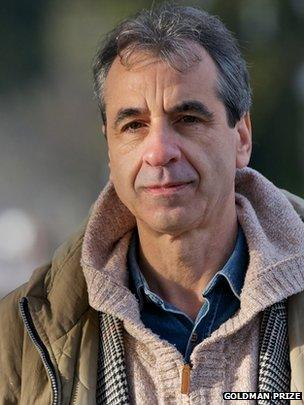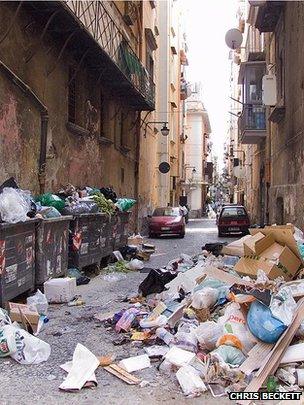Italy waste campaigner wins 2013 Goldman Prize
- Published

Rossano Ercolini began campaigning in 1976 when he opposed plans to build an incinerator
An environmental campaigner, considered to be the driving force behind Italy's zero-waste movement, is one of the winners of the 2013 Goldman Prize.
Rossano Ercolini convinced Naples - a city gripped by a long-running waste crisis - to adopt zero-waste goals.
Other winners include an anti-fracking campaigner from Africa and an Iraqi leading a marsh restoration project.
The awards, called the Oscars of the environment movement, will be presented at a ceremony in San Francisco.
Reacting to the news, the 56-year-old primary school teacher said: "I am a bit shocked because I have been committed to what I do for a very long time.
"I was aware that there was some attention on my work but I did not know that there was international attention looking at what I was doing," he told BBC News.
His first taste of grassroots campaigning was back in the mid-1970s when plans were unveiled to build an incinerator near the school where he taught.
In 1994, proposals to construct two incinerators in his hometown of Lucca led to him focusing his efforts on the issue of tackling the growing problem of waste.
Today, as an organising member of the Zero Waste International Alliance, his campaign to encourage recycling and waste reduction has led to 117 municipalities across Italy closing incinerators and committing to zero-waste strategies.
'Immoral waste'
As well as politicians and business leaders, Mr Ercolini even got the clergy, in the guise of the bishop of Lucca, involved by describing the use of incinerators to burning waste as "immoral".

Naples has suffered from a waste problem for years, with piles of rubbish in the streets at its peak
"There are people in the world that die as a result of a lack of food, while there is another half of the world that is wasting too much."
In 2011, Mr Ercolini secured arguably one of his biggest campaigning successes when Napoli's mayor agreed to adopt a zero-waste strategy.
The city, home to almost a million people, has been gripped by waste management problems - including reports of Mafia involvement - since the 1990s.
The problem reached its visible peak in 2007 when rubbish bags were left piled in the city's streets, uncollected for weeks or longer.
As part of the solution, the city's unrecycled waste, unable to go to landfill or be incinerated, is being shipped to a refuse processor in the Netherlands.
Campaigners are calling for this to be stopped, and the mayor has agreed to do so as soon as it is possible.
Mr Ercolini says that they are maintaining "very strong pressure" to ensure the politician delivers on his promise.
The Goldman Prize winner added that the answer was not to bury or burn the waste, allowing the problem to "disappear" because out of sight was out of mind.
Other winners of the 2013 awards were:
Jonathan Deal, South Africa: led a successful campaign against fracking in South Africa to protect the Karoo, a semi-desert region, valued for its agriculture and wildlife.
Azzam Alwash, Iraq: returned to the country from the US to lead local communities in restoring the once-lush marshes that had been allowed to dry out under Saddam Hussein's regime.
Aleta Baun, Indonesia: organised local villagers to occupy marble mining sites in order to prevent the destruction of sacred forestland on the island of Timor.
Kimberly Wasserman, US: led a local campaign to shut down two of the nation's oldest coal-fired power plants and transform Chicago's old industrial sites into parks and multi-use spaces.
Nohra Padilla, Colombia: organised Colombia's marginalised waste pickers, in the face of political opposition and threats of violence, in order to make recycling a legitimate part of waste management.
- Published9 May 2011
- Published26 November 2010
- Published31 October 2010